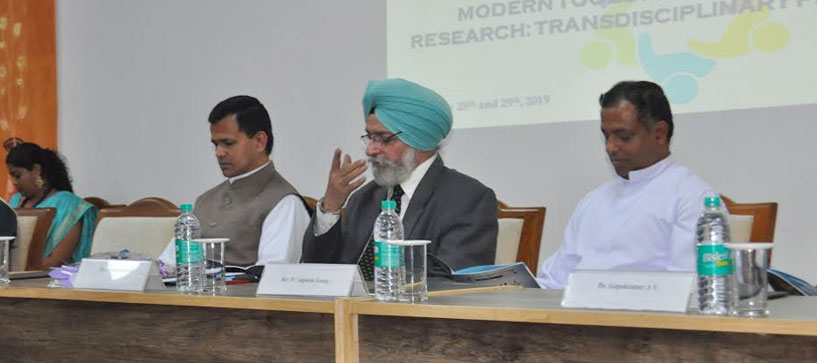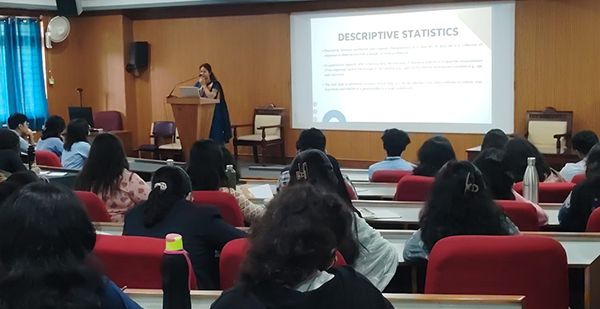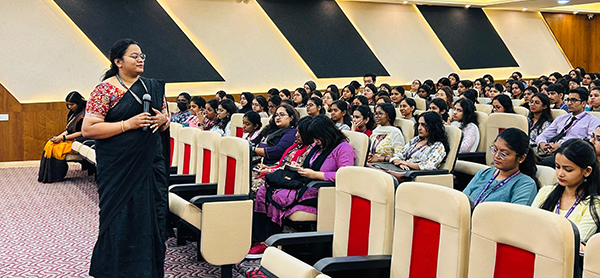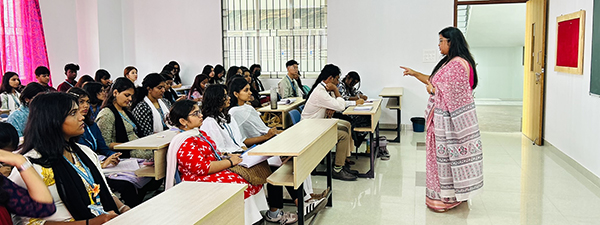
Value Added Course
Value Added Course Statistical Analysis in Psychology
Date: 19 to 24 July 2025
The Department of Psychology offered a value-added course on “Statistical analysis in psychology” for the 3rd -year BA Psychology A, B, PYJO, and PYEN from 19 July to 24th July 2025.
This programme was designed to equip students with essential skills and fundamentals of descriptive and inferential statistics in psychological research. The program was designed to enable students with the understanding of data distributions, variability, and hypothesis testing. The course also provided hands-on experience with statistical software JAMOVI for data analysis which helps the students to develop critical thinking in selecting and applying the correct statistical tests for varied research designs.
Through a series of interactive sessions, students learned critical thinking, statistical software JAMOVI for data analysis, interpretation and reporting of statistical outcomes in APA style. This course emphasized on practical applications and the role of statistics as a bridge between psychological theory and empirical validation. It encouraged students to develop a research-oriented mind-set and analytical competence in handling real-world psychological data.
In addition to theoretical understanding, the course included fundamentals and hands-on experience, group discussions, allowing students to practice and refine their skills. Experts facilitated the sessions, bringing their expertise and insights to the classroom.
The feedback from participants was overwhelmingly positive, with many students expressing increased confidence in their ability to use the statistical software in their upcoming researches. The course not only enriched their academic learning but also prepared them for future competence and capability strengthening their research and statistical knowledge.
The successful completion of this course represents a significant milestone in the students' educational journey, equipping them with practical skills that are essential for their future careers in research design applications in psychology.

Value Added Course Report: Negotiation in Relationships
Date: 10 to 15 July 2025
The Department of Psychology, Kristu Jayanti (Deemed to be University), successfully organised a Value-Added Course titled “Negotiation in Relationships” for III Semester M.Sc Psychology, Counselling Psychology, and Clinical Psychology students from July 10th to July 15th, 2025.
A total of 291 students enthusiastically participated in the five-day course, which featured engaging sessions on Foundations of Friendships and Relationships, The Psychology of Love, When Relationships Go Wrong, Flourishing and Positive Relationships, and Integration and Application. Topics included understanding friendship and love, recognizing relationship challenges, conflict resolution, and practical application through role plays and simulations. These sessions provided students with a deeper understanding of interpersonal dynamics and practical knowledge on handling various relationship challenges.
Students actively participated throughout the course, engaging in insightful discussions and interactive activities. Students thoroughly enjoyed the sessions and provided highly positive feedback. Many expressed that the course was insightful, engaging, and a valuable addition to their academic journey, helping them gain practical skills that will benefit their personal relationships and professional growth.

Value Added Course (VAC) on Mindfulness-Based Stress Reduction
Date: 08 to 12 July 2025
The Department of Psychology, KRISTU JAYANTI (DEEMED TO BE UNIVERSITY), Bengaluru, organised a Value Added Course (VAC) on Mindfulness-Based Stress Reduction for III Semester B.Sc. Psychology students. The course was conducted from 8th July 2025 to 12th July 2025 at H1 Auditorium, Humanities Block.
The Value Added Course focused on equipping students with practical tools for managing stress through mindfulness practices. The theme of the course, “Present Awareness, Inner Balance”, aimed at fostering self-regulation, emotional well-being, and mental clarity among students. Sessions were designed to enhance students' awareness of the present moment, reduce anxiety, and cultivate a balanced psychological state.
The course comprised experiential modules that included guided meditations, breathing techniques, body scans, and reflective discussions. All sessions were facilitated by faculty members from the Department of Psychology with expertise in mindfulness and mental health education. The curriculum emphasized the application of mindfulness in academic, personal, and interpersonal domains.
The course was well-received by the students, who actively participated and shared positive feedback regarding the impact of mindfulness on their daily stress levels. An assessment was conducted and E-Certificates were issued to participants who successfully completed the course.


